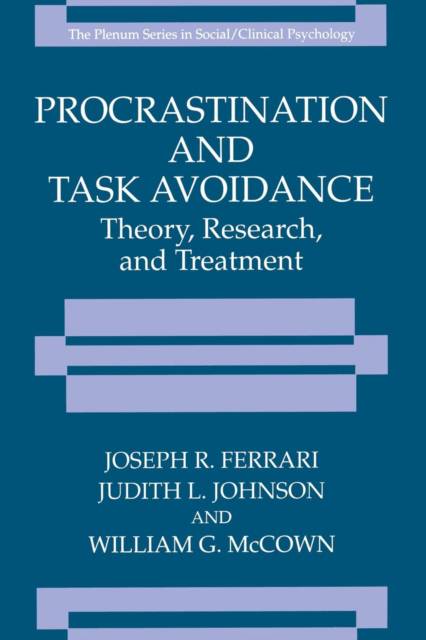
- Afhalen na 1 uur in een winkel met voorraad
- Gratis thuislevering in België vanaf € 30
- Ruim aanbod met 7 miljoen producten
- Afhalen na 1 uur in een winkel met voorraad
- Gratis thuislevering in België vanaf € 30
- Ruim aanbod met 7 miljoen producten
Zoeken
Procrastination and Task Avoidance
Theory, Research, and Treatment
Joseph R Ferrari, Judith L Johnson, William G McCown
€ 273,45
+ 546 punten
Uitvoering
Omschrijving
Procrastination is a fascinating, highly complex human phenomenon for which the time has come for systematic theoretical and therapeutic effort. The present volume reflects this effort. It was a labor of love to read this scholarly, timely book-the first of its kind on the topic. It was especially encouraging to find that its authors are remarkably free of the phenomenon they have been investigating. One might have expected the opposite. It has often been argued that people select topics that trouble them and come to understand their problems better by studying or treating them in others. This does not appear to be true of the procrastination researchers represented in this book. I base this conclusion on two simple observations. First, the work is replete with recent refer- ences and the book itself has reached the reader scarcely a year following its completion. Second, when one considers the remarkable pace of pro- grammatic research by these contributors during the past decade, it is clear that they are at the healthy end of the procrastination continuum. The fascinating history of the term procrastination is well documented in this book. The term continues to conjure up contrasting, eloquent images-especially for poets. When Edward Young wrote in 1742, "Pro- crastination is the Thief of Time," he was condemning the waste of the most precious of human commodities.
Specificaties
Betrokkenen
- Auteur(s):
- Uitgeverij:
Inhoud
- Aantal bladzijden:
- 268
- Taal:
- Engels
- Reeks:
Eigenschappen
- Productcode (EAN):
- 9781489902290
- Verschijningsdatum:
- 26/06/2013
- Uitvoering:
- Paperback
- Formaat:
- Trade paperback (VS)
- Afmetingen:
- 156 mm x 234 mm
- Gewicht:
- 412 g

Alleen bij Standaard Boekhandel
+ 546 punten op je klantenkaart van Standaard Boekhandel
Beoordelingen
We publiceren alleen reviews die voldoen aan de voorwaarden voor reviews. Bekijk onze voorwaarden voor reviews.











